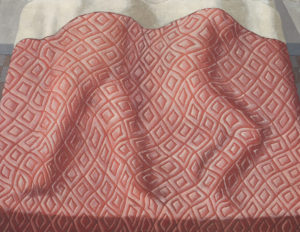| Fondazione Prada will present the exhibition Domenico Gnoli in Milan from October 28, 2021 to February 27, 2022. The press preview will be held on Wednesday, October 27, from 10am to 2pm.
This retrospective is part of the series of exhibitions that Fondazione Prada has dedicated to artists—such as Edward Kienholz, Leon Golub and William Copley—whose practice developed along paths and interests that took a different direction from the main artistic trends of the second half of the 20th century. The aim is to explore Gnoli’s practice and his activity as a unique discourse free of labels, documenting links with the international cultural scene of his time and highlighting affinities with contemporary visual research. Furthermore, Domenico Gnoli will expand on the insights of those who, in the past, interpreted the artist’s work from an original historical and critical viewpoint, recognizing the inspiration that he drew from the Renaissance and highlighting the narrative value of his works.
Conceived by Germano Celant, the exhibition brings together over 100 works produced by the artist between 1949 and 1969 and will be complemented by as many drawings. A chronological and documentary section featuring materials, photographs and other items will retrace the biography and artistic career of Domenico Gnoli (Rome, 1933–New York, 1970) more than fifty years after his death. The project has been realized in collaboration with the artist’s archives in Rome and Mallorca, which preserve Gnoli’s personal and professional heritage.
Created by the design studio 2x4 in New York, the two-floor exhibition setting inside the Podium harks back to 20th-century museum environments by tracing linear perspectives that divide the exhibition space into a series of monographic units. The artist’s works are arranged in themed series that reveal how each painting generated other works following a logical development of expression. Packed with significance, the details that Gnoli painted suggest enigmatic biographies of the objects represented and testify to the artist’s conviction in pursuing his own research in a radical reinterpretation of classical representation.
The exhibition is accompanied by a scientific publication published by Fondazione Prada and designed by Irma Boom. The book features a new essay written for the exhibition by Salvatore Settis and two parallel illustrated chronologies that set Gnoli in the historical and artistic time in which he worked, providing a reconstruction of the artist’s career and biography. |

